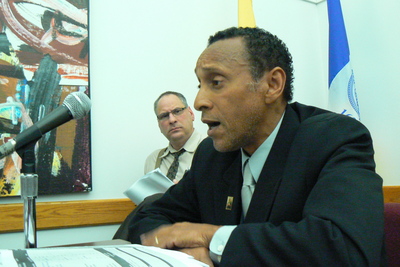How bad is unemployment in Jersey City?
In September, the unemployment rate in Jersey City was 12 percent, according to the U.S. Bureau of Labor Statistics, a 66 percent jump from the 7.2 percent rate in September of 2008.
That means 13,989 people were not working, out of a labor force of 116,815 residents. A labor force consists of everyone in a population from working age (usually 16 years) to those under the age of retirement (around age 62) who can actively work.
Jersey City’s 12 percent rate is higher than the state’s 9.8 percent rate as of September. The state’s rate is about the same as the national average, currently 10 percent.
“The question isn’t why I have not found a job, but why didn’t a job find me?”— ‘Jenny’, unemployed single mother
________
But there is hope.
Gov. Jon Corzine announced in September that for those long-term or “structurally unemployed,” the state Department of Labor and Workplace Development will provide, through federal stimulus funds, $2,400 to employers for each new person they hire who had run out of unemployment insurance benefits.
The new workers must make at least $15 an hour and stay for at least six months in order for the employer to receive the $2,400 bonus.
Also, the U.S. Senate voted on Wednesday to extend unemployment benefits for an additional 14 weeks to jobless workers, and for six weeks on top of that for those in high-unemployment states. The House of Representatives is expected to approve this legislation as soon as possible and send it to President Barack Obama to sign into law.
To qualify for unemployment benefits in New Jersey, a person must work at least 20 base weeks in covered employment or have earned $7,200. For weeks worked in 2007, 2008 and 2009, the weekly earnings needed to establish a base week was $143. These wages must have been earned during a 52-week period that is called a base year.
The amount of unemployment benefits one receives in New Jersey is called the Weekly Benefit Rate (WBR), and is 60 percent of the average weekly earnings during your base year period, up to a weekly maximum of $584 in 2009. The average unemployment insurance payment nationally is $308 per week and usually expires after six months. However the benefits have been extended twice in this current recession.
Coping with no work
Unemployment has had an impact on sisters Jenny and Arianna (not their real names), both from Jersey City.
Arianna came to back to her native Jersey City recently after she was laid off from a job as a hotel administrator in Florida. The unemployment rate in Florida for September was 11 percent. Arianna is waiting for a renewal of her unemployment benefits, and says she may go back to school if she is accepted into a state program.
Jenny is a single mother with one child who lives in a studio apartment and has been out of work for about two years. She was last employed as a human resources assistant at a food service management company in North Jersey.
Jenny said after she lost her job, she took time off to raise her son, hoping she would be able to get back into the job market. She found out that was not realistic, and meanwhile, her unemployment benefits expired.
“I went and studied to become a medical assistant, but there are not a lot of job openings,” Jenny said. “The question isn’t why I have not found a job, but why didn’t a job find me?”
Jenny said she looks forward to being part of the program Corzine initiated to get people back to work.
Arianna thought it would be easier to find a job in Jersey City. Unlike the Florida town where she lives, there is a public transportation system here. But she picked up on how tough the job situation was locally during a recent visit to K-Mart.
“I saw the place was pretty busy for a weekday, and I have to think it’s because [people] are out of work and have a lot of time to shop,” Arianna said.
Working at getting people work
Keith Davis was waiting for the Oct. 13 City Council caucus in Jersey City when he spent a few minutes talking with a reporter about a subject he knows all too well – jobs.
Davis is the executive director of the Jersey City Employment and Training Program, an autonomous agency that receives federal funds to help local residents find work. Davis was at the caucus to address the council about the $4.1 million in federal stimulus funds they would vote to accept at a council meeting the next day.
Davis sees numerous people come into his office on Academy Street already “beating themselves up” for not finding work and having a chip on their shoulder before they visit a future job site.
“Guys come in wearing doo-rags and they’re upset about employers who don’t look like them,” Davis said. “I tell them you just can’t go to work any way you want; dressing professionally and working hard is what people hiring you want to see.”
Davis also waxed optimistic about the economy, saying, “it will get better.”
At the caucus, Davis spoke about the importance of receiving the federal funds and thanked the council for considering a vote to accept the funds. The council eventually voted to accept them at their Oct. 14 meeting.
Ricardo Kaulessar can be reached at rkaulessar@hudsonreporter.com.
